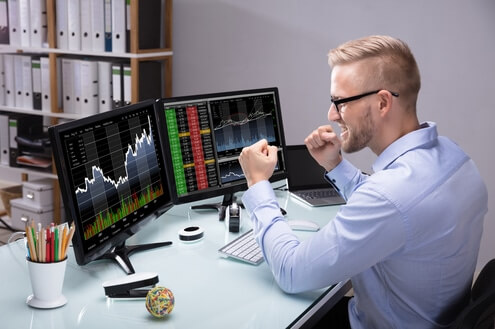
Is Forex Trading Good for Beginners?
Is forex trading for beginners? It’s a question bothering many newbies. You’re a new trader, or you want to become one. Logic dictates that you’ll specialize in one asset category and spread out. You’re interested in Forex but unsure if buying and selling currencies is good for beginners. If that’s close to your situation, our text should help you clear things up.
Forex is a popular way to trade, and there are tons of online brokers that specialize in currency trading. Forex actually stands for foreign exchange, and it’s a market where currencies are exchanged for one another. It’s not a trading-exclusive term, as even changing your dollars into euros for a family trip counts as Forex market participation.
But our text isn’t about your trip to Europe. Instead, we’re interested in the use of Forex as a trading asset. So let’s dig into the advantages, disadvantages, and alternatives of trading currencies.
Why Beginners Should Trade Forex
Forex has three significant categories; majors, minors, and exotics. When you trade Forex, you always trade a pair of currencies, and you’re hoping for the first to go up or the second to go down.
As you know, major global currency values don’t often change drastically. And the first two categories, majors and minors, only contain major currency pairs. That means they’re relatively stable, and changes within them are incremental.
As such, Forex trading for beginners has two primary advantages. It’s a good learning tool for trading tactics that rely on making a series of marginally profitable trades. Also, the stability of majors and minors means you can’t lose a ton of money at once. There’s a caveat to that, but we’ll mention that in the disadvantages section.
One thing we can tell you right away is that we don’t think Forex is the best asset for beginners. The advantages are nice, but the disadvantages outweigh them and make other assets a more appropriate choice.

Is Forex For Beginners – The Dangers of Beginner Forex Trading
While it’s still fresh in your memory, we’d like to return to the caveat we mentioned. Namely, while Forex trading doesn’t incur massive losses if you trade responsibly, it’s easy to get carried away.
A lot of Forex brokers offer massive leverage to traders with the promise of quick and significant profits. On top of that, the incremental nature of losses makes them less noticeable, making it easy to lose more than you intend. And since Forex positions are often large in nature, a change of 0.1% can result in hundreds or thousands of your money.
But if you stay aware, you can negate that disadvantage completely. There is, however, one much more significant downside. It’s that such a huge amount of info goes into Forex markets that it’s impossible for beginners to keep up.
Each Forex pair involves two currencies, and if we’re talking about majors and minors, they’re from developed countries. Their values are determined by a massive breadth of factors.
It can be their monetary policy, recent deals, the political landscape, the effect of any unions they belong to, etc. Just reading up on Forex-related info takes a lot of time, and estimating how it will impact markets takes even longer. Getting actually good at that is a lengthy and strenuous process.
Forex trading can be difficult for beginners and may not be suitable for everyone, especially short term trading. Trading can be too complex for a beginner to learn, and can easily get carried away.
Whether Forex is good or not for you depends on your financial condition, goals, and the investing experience you have as a beginner trader. Beginners must be careful and exercise caution, especially as many Forex traders lose money.
In general all beginners can master Forex but you need to pay special attention to the following mistakes.
Is forex trading good for beginners – Tips to avoid mistakes
Neglecting learning
So, is forex trading for beginners? Forex trading is a profession in its own right, and as with all professions in the world, you must first learn it. Many beginners think that it is enough to open a trading account and read a few daily analyzes to have the keys to success in their hands. Unfortunately, it’s not that simple.
A common mistake that Iwehave often noticed is the desire to start quickly, without having taken the trouble to train or, at least, to obtain information.
To remedy this, you will find numerous specialized books and trading training, an essential step for anyone wishing to trade on forex.
There are certain rules and certain knowledge that you can only acquire by following training with a professional. Neglecting this step is like setting off to travel around the world with a flat wheel. We can move forward a little, but it won’t last long.
Setting unachievable goals
Due to a lack of market knowledge, beginners often seek to obtain unrealistic and unachievable performance. To begin with, a beginner must set one goal: not to lose.
Then, if you make 30% per year, you will then perform better than Warren Buffet who achieves on average a performance of 23% per year.
What makes the results of the billionaire cited above interesting is that he owes his popularity more to the stability of his results than to their level of return, since he obtained an average return of 23% out of 36 years.
We don’t think we would be talking about Warren Buffet today if he had targeted or announced a monthly performance of 20% over the last three months.
So firstly, try not to lose. Then, if you succeed, try aiming for a small goal,
If you can achieve it, then you can try to aim for a higher performance. Success lies in consistency.
Using too much leverage
The leverage multiples offered by forex brokers go up to 500 to 1!
The use of leverage is certainly one of the most interesting aspects of the currency market, but you still need to know how to use it sparingly.
We sometimes hear that 50:1 or 100:1 is not enough because other brokers offer more.
Although there is a theory that having more rounds in your rifle is better, remember that using 10:1 leverage puts your account at a daily risk of loss of 15 % if volatility reaches 1.5% during the day.
At this rate, four or five losing trades in a row can wipe out your entire trading account. It is therefore strongly recommended not to use leverage when starting out.
After a few months of practice and greater comfort, it is advisable not to exceed 5:1 leverage, which already seems enormous to me.
Want to invest in all many pairs
Diversification is one of the crucial forex trading strategies. It can be a good thing when you are a prudent investor. As the saying goes, you shouldn’t put all your eggs in one basket.
But when you start trading on forex, it is impossible to be able to correctly follow all the currency pairs and the news related to each of them. Each currency pair reacts according to its own parameters.
In the same scenario, two currency pairs will not behave in the same way. To avoid getting lost, it is best to start by focusing on one and only one currency pair.
Not putting stop losses
Correctly placing a stop loss is not easy, especially for beginners.
As a result, even if the beginner trader has taken a position in the right direction of the market, he will lose money by executing a poorly placed stop loss. The logical next step for the beginner is therefore to abandon the use of the stop loss.
But sooner or later, trading without a stop loss will probably generate significant losses. This is a very common error that causes many accounts to be closed through margin calls. It is therefore imperative to put a stop loss on each position entered into the market.
If you don’t know how to place a stop loss, there is plenty of training (free and paid) to help you better understand how to do it. OANDA will soon offer free webinars on this subject.
Not applying money management rules
Some beginners are not shocked by putting 15 or 20% of the capital at risk on a transaction.
The main rule of money management is simple. You should never put at risk more than 1 or 2% of your account on a transaction.
You can have an excellent trading strategy, but if you do not respect the rules of prudence in risk management, you exponentially increase the risk of bankruptcy.
Making small losses often, and making a big profit once in a while is a good idea of what someone who manages their capital properly should do.
Not cutting you losses
A common mistake is to accumulate losing positions without wanting to cut them. Because to cut a loss is to admit that you were wrong. And it’s not easy.
We often hear that as long as the position is open there is no loss (the famous saying “no sale, no loss”. However, a latent loss is indeed a very real loss at the moment t.
It is generally better to exit a losing position, and the sooner the better. Because the greater the loss, the more difficult it will be to close the transaction.
If this helps you, remember this: we don’t trade in forex to be right but to make money.
Cutting profits too soon
After a period of loss, and with all the stress that this can generate, some people will cut their profit too soon, no matter how small it may be.
As soon as the balance is positive, the transaction will be closed.
We therefore see novice traders allowing losses of €800 to run and as soon as the position becomes profitable by €5, they close the transaction, relieved to no longer be in a negative situation. You must try to win at least 3 for 2 risky.
Neglecting the impact of the spread
We can think that 1 pip more or less on the spread will not change anything.
This may be true on one or two transactions.
But you make two trades per day over a year, the difference will be 520 pips or around 26% if you are used to using 5:1 leverage.
A strategy can therefore generate profits with a spread of 1.5 but lose with a spread of 2.5.
So don’t neglect any detail.
Impatience is the enemy
When trading, you sometimes have to be patient because you have to look for the right opportunity, wait for market conditions to be favorable to the strategy you are applying, etc.
However, beginners will often make the mistake of taking a position without respecting the plans or strategies previously put in place because it is more exciting to be in the market than to follow its evolution.
Be rigorous with yourself in respecting your trading plan.
Is Forex trading for beginners – In Conclusion
Unfortunately, there is no miracle method of trading.
Many beginners enter the market looking for a way to generate profits easily, from home and without making any effort.
While it is obviously possible to achieve very good performances on the currency market, there is no easy way to make real money on the financial markets, in the same way as the goose that lays golden eggs ‘does not exist. Remember that 89.4% of individual traders lose money according to may studies.




